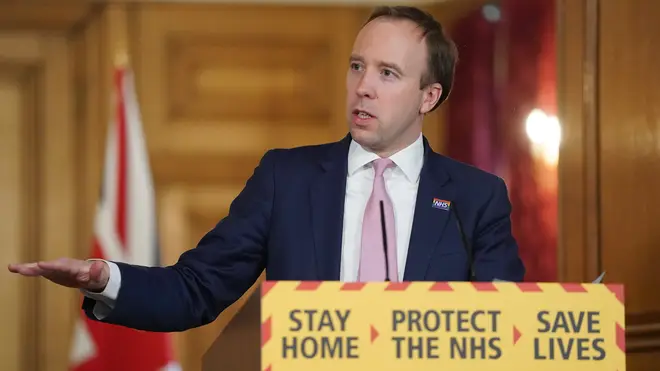
Henry Riley 7pm - 10pm
27 April 2020, 17:12

Health Secretary Matt Hancock has announced a life assurance scheme for NHS and frontline workers, giving £60,000 to the families of those lost to coronavirus.
The secretary of state confirmed that 82 NHS workers had so far lost their lives after testing positive for coronavirus, along with 16 social care workers, which is why he has introduced the scheme.
When announcing the new measure, Mr Hancock said he feels "a deep personal sense of duty that we must care for their loved ones."
"Today, I am able to announce that the government is setting up a life assurance scheme for NHS and social care frontline colleagues," he added.
"Families of staff who die from coronavirus in the course of their essential frontline work will receive a £60,000 payment.
"Of course, nothing replaces the loss of a loved one but we want to do everything we can to support families who are dealing with this grief."
For all the latest coronavirus updates, follow our live blog here

WATCH LIVE: Coronavirus press conference (27 April 2020)
He said the government was also looking at other frontline professions who did not have access to a life assurance scheme to see whether they would require one.
Families will still be able to retain their right to pursue legal action even if they receive a payout in the scheme, the health secretary added.
Mr Hancock was leading the government's daily press briefing from Downing Street, during which members of the public were able to ask questions for the very first time.
More than 15,000 questions have been submitted so far for the briefings.
Lyn from Skipton was the first person to have her query read out, asking whether seeing one's grandchildren would be one of the first lockdown measures to be relaxed.
The question was passed on to Chief Medical Officer for England Professor Chris Whitty to answer, who said it depends on circumstances, age, and underlying health conditions.
Do you have a question for Matt Hancock? The Health Secretary will be live with Nick Ferrari from 8am tomorrow https://t.co/RH1lOIps6d
— LBC News (@LBCNews) April 27, 2020
Mr Hancock also confirmed that the number of people to die in UK hospitals after testing positive for coronavirus has risen by 360 to 21,092 - the lowest daily rise since 30 March.
However, Prof Whitty said the country is not "consistently" past the peak of coronavirus deaths as there was an "artificial drop" over the weekend caused by lower notification rates.
Overall A&E attendances have dropped by more than a half during the pandemic because people are “not coming forward to use the NHS for things that matter,” he said.
“Please, come forward,” the health secretary added.
He also announced the resumption of some urgent NHS services, such as cancer care and mental health support, however this will be undertaken on a local level.
Listen & subscribe: Global Player | Apple Podcasts | Google Podcasts | Spotify
Mr Hancock confirmed the government is still aiming to conduct 250,000 tests a day - including antibody tests.
"We want testing to continue to increase. As you will know, the prime minister set a goal of 250,000 some time ago - especially for when the antibody tests come on stream.
"But, so far, there isn't one of those that is clinically valid."
He added that those tests would be enough for the "test, track and trace" plan which would be part of the next stage of the coronavirus response.
"The lower the number of new cases, the more effective a system of test, track and trace of any scale is.
"Therefore, 100,000 tests a day is a big enough testing system to start test, track and trace, but if it is bigger then the system can work on a higher number of cases and be more effective."